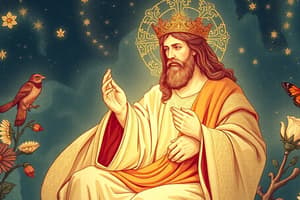Podcast
Questions and Answers
What are the primary religions of the world?
What are the primary religions of the world?
Christianity, Islam, Buddhism, Hinduism, Sikhism, and Judaism
Match the following key concepts of Christianity with their corresponding definitions.
Match the following key concepts of Christianity with their corresponding definitions.
Atonement = The belief that Jesus' death on the cross paid the penalty for sin on behalf of humankind. Divine Command Theory = The belief that some moral principles are right because God commands it. The Holy Spirit = One of the persons of the Trinity that is a vital force in the life of Christians, enabling them to live godly lives. Incarnation = The Christian belief that God, in the person of Jesus, became fully human and lived among us. Inter-faith dialogue = Discussions between members of different religious traditions to promote understanding and peace. Messiah = The Anointed One, sent by God to bring salvation to the world. Omnibenevolence = All loving Omnipotence = All powerful. Omniscience = All knowing. Resurrection = The belief that Jesus rose from the dead on the third day from when he was crucified, conquering death. Trinity = God the Father, Son and Holy Spirit
What is the name of the first book of the Bible?
What is the name of the first book of the Bible?
Genesis
In what year was the world created?
In what year was the world created?
What makes Christians believe that humans are special?
What makes Christians believe that humans are special?
What is the name of the type of love that is unconditional?
What is the name of the type of love that is unconditional?
Christians believe that Jesus is the Son of God.
Christians believe that Jesus is the Son of God.
Which of these is NOT a characteristic of God?
Which of these is NOT a characteristic of God?
Flashcards
Agape
Agape
Unconditional love. The most important type of love in Christianity.
Atonement
Atonement
The belief that Jesus' Death and Resurrection healed the rift between humans and God.
Divine Command Theory
Divine Command Theory
The belief that something is right because God commands it.
Holy Spirit
Holy Spirit
Signup and view all the flashcards
Incarnation
Incarnation
Signup and view all the flashcards
Inter-faith dialogue
Inter-faith dialogue
Signup and view all the flashcards
Messiah
Messiah
Signup and view all the flashcards
Omnibenevolence
Omnibenevolence
Signup and view all the flashcards
Omnipotence
Omnipotence
Signup and view all the flashcards
Omniscience
Omniscience
Signup and view all the flashcards
Resurrection
Resurrection
Signup and view all the flashcards
Trinity
Trinity
Signup and view all the flashcards
The Trinity
The Trinity
Signup and view all the flashcards
God the Father
God the Father
Signup and view all the flashcards
God the Son (Jesus)
God the Son (Jesus)
Signup and view all the flashcards
God the Holy Spirit
God the Holy Spirit
Signup and view all the flashcards
Imago Dei
Imago Dei
Signup and view all the flashcards
Stewards of Creation
Stewards of Creation
Signup and view all the flashcards
Free will
Free will
Signup and view all the flashcards
Human dignity
Human dignity
Signup and view all the flashcards
Sacredness of human life
Sacredness of human life
Signup and view all the flashcards
Genesis
Genesis
Signup and view all the flashcards
Genesis 1
Genesis 1
Signup and view all the flashcards
Genesis 2
Genesis 2
Signup and view all the flashcards
Genesis 3
Genesis 3
Signup and view all the flashcards
Monotheism
Monotheism
Signup and view all the flashcards
Omnipresence
Omnipresence
Signup and view all the flashcards
Transcendent
Transcendent
Signup and view all the flashcards
Study Notes
Interpretations of Genesis
- Genesis is the first book of the Bible
- It describes the creation story and the relationship between God and humans
The Life of Jesus
- Jesus' sacrifice on the cross saved humanity
- This allowed humans and God to be at one again
Jesus as the Messiah
- Christians believe Jesus is the Messiah
- The Messiah is the anointed one sent by God to be a savior
Moral Decisions
- The Ten Commandments are moral guidelines
- Christians believe in following these guidelines to live a good life
Worship
- Christians worship God
- Christians believe in the Holy Spirit's presence
Role of the Church
- The church is a community of Christians
- God is at work in the world through the Holy Spirit
- Discussions between different religions can create mutual respect and tolerance
Key Christian Concepts
- Agape: Unconditional, selfless love
- Atonement: Jesus' death reconciled humans with God
- Divine Command Theory: Actions are right if God commands them
- Incarnation: God becoming human in Jesus
- Inter-faith Dialogue: Communication between different faiths
- Messiah: Anointed one, savior
- Omnibenevolence: All-loving
- Omnipotence: All-powerful
- Omniscience: All-knowing
- Resurrection: Jesus rising from the dead
- Trinity: Three persons of God (Father, Son, and Holy Spirit)
Studying That Suits You
Use AI to generate personalized quizzes and flashcards to suit your learning preferences.




